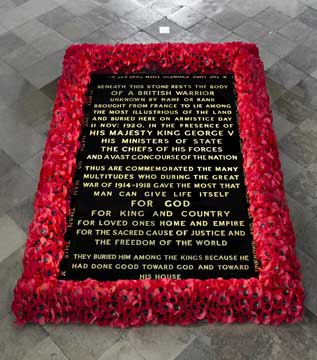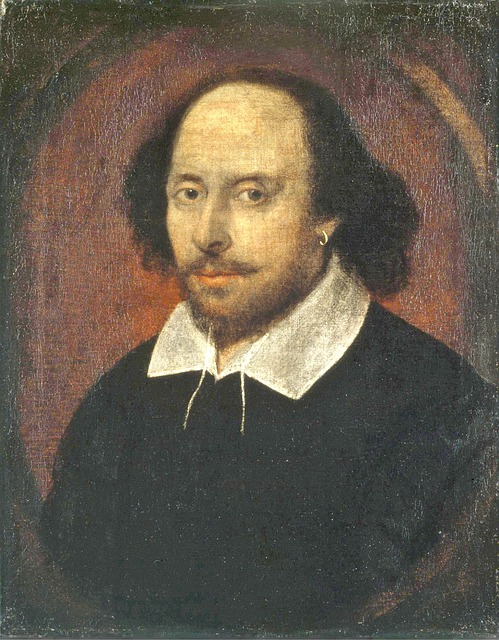Difference between revisions of "Tomb of the Unknown Warrior"
From Londonhua WIKI
| Line 22: | Line 22: | ||
The Tomb of the Unknown Warrior first came to fruition when Reverend David Railton, a chaplain at the front, found a grave of in the garden at Armentières, France in 1916. The grave had a makeshift cross, which was inscribed in pencil “An Unknown Soldier”. This gave the reverend the inspiration to write to the Dean of Westminster for a grave to be created for all of those buried without a name. Since the identity of the soldier is only known to be a man on the French front, many visit the grave because it could have been their son or father that they are paying their respects to. | The Tomb of the Unknown Warrior first came to fruition when Reverend David Railton, a chaplain at the front, found a grave of in the garden at Armentières, France in 1916. The grave had a makeshift cross, which was inscribed in pencil “An Unknown Soldier”. This gave the reverend the inspiration to write to the Dean of Westminster for a grave to be created for all of those buried without a name. Since the identity of the soldier is only known to be a man on the French front, many visit the grave because it could have been their son or father that they are paying their respects to. | ||
The grave selected is made of black marble and is surrounded by poppies that symbolize remembrance. Inscribed on the grave is: | The grave selected is made of black marble and is surrounded by poppies that symbolize remembrance. Inscribed on the grave is: | ||
| − | + | <br> | |
<ref> Westminster Abbey » Unknown Warrior. (n.d.). Retrieved May 15, 2017, from http://www.westminster-abbey.org/our-history/people/unknown-warrior </ref> | <ref> Westminster Abbey » Unknown Warrior. (n.d.). Retrieved May 15, 2017, from http://www.westminster-abbey.org/our-history/people/unknown-warrior </ref> | ||
| + | |||
BENEATH THIS STONE RESTS THE BODY <br> | BENEATH THIS STONE RESTS THE BODY <br> | ||
OF A BRITISH WARRIOR <br> | OF A BRITISH WARRIOR <br> | ||
| Line 52: | Line 53: | ||
UNKNOWN AND YET WELL KNOWN, DYING AND BEHOLD WE LIVE, <br> | UNKNOWN AND YET WELL KNOWN, DYING AND BEHOLD WE LIVE, <br> | ||
(base) IN CHRIST SHALL ALL BE MADE ALIVE. <br> | (base) IN CHRIST SHALL ALL BE MADE ALIVE. <br> | ||
| − | + | <br> | |
The United States awarded the highest award of bravery, the Congressional Medal of Honor, to the Unknown Warrior. Also during the royal wedding of King George VI, Lady Elizabeth Bowes Lyon laid one of the wedding bouquets on the grave as a sign of respect. This tradition has been held ever since. | The United States awarded the highest award of bravery, the Congressional Medal of Honor, to the Unknown Warrior. Also during the royal wedding of King George VI, Lady Elizabeth Bowes Lyon laid one of the wedding bouquets on the grave as a sign of respect. This tradition has been held ever since. | ||
Revision as of 12:33, 15 May 2017
 The grave covered covered by a border of poppies | |
| The Tomb of the Unknown Warrior | |
|---|---|
| Inscription by | Herbert Ryle, Dean of Westminster |
| Burial Date | c. Nov. 11, 1920 |
| Location | Westminster Abbey, London |
Overview
The Tomb of the Unknown Warrior can be found at Westminster Abbey and represents all of the British soldiers who passed away in World War I. It can be found in the nave of Westminster Abbey and the grave was buried on November 11, 1920. The tomb is meant to show teach the atrocities of war and honor those who made the ultimate sacrifice of their life for the better good of the country. It was also meant to show that in the house of God, wealth and fame does not matter and all who were good will be judged accordingly.
Contents
Background or Origin of Article
The Tomb of the Unknown Warrior first came to fruition when Reverend David Railton, a chaplain at the front, found a grave of in the garden at Armentières, France in 1916. The grave had a makeshift cross, which was inscribed in pencil “An Unknown Soldier”. This gave the reverend the inspiration to write to the Dean of Westminster for a grave to be created for all of those buried without a name. Since the identity of the soldier is only known to be a man on the French front, many visit the grave because it could have been their son or father that they are paying their respects to.
The grave selected is made of black marble and is surrounded by poppies that symbolize remembrance. Inscribed on the grave is:
[1]
BENEATH THIS STONE RESTS THE BODY
OF A BRITISH WARRIOR
UNKNOWN BY NAME OR RANK
BROUGHT FROM FRANCE TO LIE AMONG
THE MOST ILLUSTRIOUS OF THE LAND
AND BURIED HERE ON ARMISTICE DAY
11 NOV: 1920, IN THE PRESENCE OF
HIS MAJESTY KING GEORGE V
HIS MINISTERS OF STATE
THE CHIEFS OF HIS FORCES
AND A VAST CONCOURSE OF THE NATION
THUS ARE COMMEMORATED THE MANY
MULTITUDES WHO DURING THE GREAT
WAR OF 1914-1918 GAVE THE MOST THAT
MAN CAN GIVE LIFE ITSELF
FOR GOD
FOR KING AND COUNTRY
FOR LOVED ONES HOME AND EMPIRE
FOR THE SACRED CAUSE OF JUSTICE AND
THE FREEDOM OF THE WORLD
THEY BURIED HIM AMONG THE KINGS BECAUSE HE
HAD DONE GOOD TOWARD GOD AND TOWARD
HIS HOUSE
Around the main inscription are four texts:
(top) THE LORD KNOWETH THEM THAT ARE HIS,
(sides) GREATER LOVE HATH NO MAN THAN THIS
UNKNOWN AND YET WELL KNOWN, DYING AND BEHOLD WE LIVE,
(base) IN CHRIST SHALL ALL BE MADE ALIVE.
The United States awarded the highest award of bravery, the Congressional Medal of Honor, to the Unknown Warrior. Also during the royal wedding of King George VI, Lady Elizabeth Bowes Lyon laid one of the wedding bouquets on the grave as a sign of respect. This tradition has been held ever since.
Selection of the Soldier
Tomb of the Unknown Soldier
References
If appropriate, add a references section
External Links
If appropriate, add an external links section
Image Gallery
If appropriate, add an image gallery
Category tags
- ↑ Westminster Abbey » Unknown Warrior. (n.d.). Retrieved May 15, 2017, from http://www.westminster-abbey.org/our-history/people/unknown-warrior
